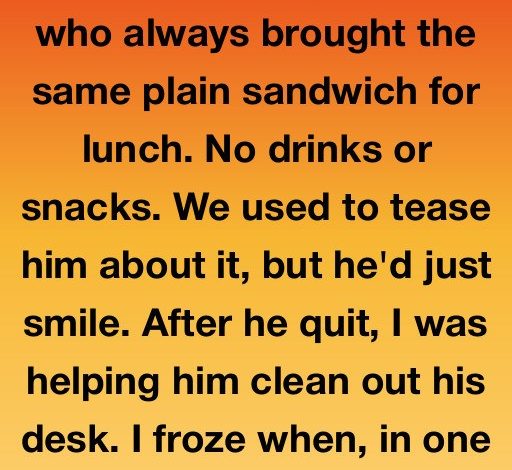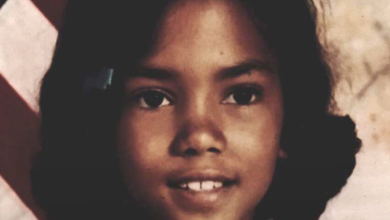The Sandwich Mans Secret!

ADVERTISEMENT
At the office, there was a quiet man named Paul. The kind you barely notice — polite, steady, almost invisible. Every day he ate the same thing: a plain peanut butter and jelly sandwich wrapped in wax paper. No chips, no drink, no variety. We teased him sometimes, lightly, the way coworkers do when they think it’s harmless. He’d just smile, shrug, and keep eating.
ADVERTISEMENT
So when Paul quit, it caught everyone off guard. No farewell email, no announcement. He told the manager, packed his cubicle, and that was it. I happened to be nearby and offered to help. He thanked me with that same quiet smile. I expected nothing more than pens and sticky notes in his desk. Instead, I found a bundle of children’s drawings tied with a worn rubber band.
ADVERTISEMENT
Hearts. Stick figures. Kids holding hands. One picture showed a sandwich floating like a gift from heaven, passed to a line of children. Another had a speech bubble: “I’m not hungry today. Thank you, Mr. Paul.”
It stopped me cold.
Paul never mentioned kids. No photos, no stories, no nieces or nephews. Just his routine, his quiet kindness, and those boring sandwiches. When I asked about the drawings, he didn’t explain. He simply said, “Ever been to the West End Library around six? Come by sometime. You’ll see.”
A few days later, curiosity drove me there. I expected something small. Instead, I saw Paul by the side entrance with a cooler bag, rows of brown paper sacks neatly packed inside. Fifteen kids — some homeless, some barely hanging on — stood waiting. One by one, he handed them a bag with steady hands and a gentle word. No speeches. No praise-seeking. Just presence.
When he noticed me, he smiled like I’d caught him watering plants, not feeding half the neighborhood’s hungry children.
“Most of them don’t get dinner,” he said. “So I figured I could make sure they get one meal a day.”
That’s when I realized: the sandwiches at work weren’t his lunch. They were practice runs. He made the same PB&J every morning because it was cheap, filling, familiar — and easy to duplicate. “No one complains,” he said. “Some of them say it’s the best part of their day.”
All those times we joked about his “boring lunch”… the guilt hit hard.
I started helping. Carrying bags, handing out food, making small talk he struggled with. He never asked for help, but he let me. One morning, while we stood in his tiny apartment making sandwiches at dawn, I asked why he did it. He kept spreading peanut butter as he answered:
“I grew up in foster care. Some nights, I didn’t eat. You learn fast how small you can feel. Hungry and invisible… that sticks with you.”
It wasn’t a speech. Just truth. For Paul, sandwiches weren’t charity. They were a way of healing a wound that never fully closed.
Then one week, he didn’t show up. No texts, no calls. At the library, a little girl tugged my sleeve: “Is Mr. Sandwich Man okay?”
Two days later, the hospital called. Me — his emergency contact. The only one.
Paul had collapsed from exhaustion. In the hospital bed, pale and embarrassed, he still smiled.
“Did you bring sandwiches?” he whispered.
I told him I had — I made them myself. He closed his eyes, relieved.
“Promise me you’ll keep it going,” he murmured. “Just until I’m back.”
I promised. And I did. For weeks, I rushed home after work, made sandwiches, and delivered them. At first, the kids eyed me warily. But when they saw the sandwiches were the same, their shoulders dropped in relief.
Eventually, coworkers noticed me leaving in a hurry. When I explained, their guilt mirrored mine. One by one, they joined in. Fridays became Sandwich Fridays. The break room filled with bread, peanut butter, jelly, and paper bags. Someone even made stickers — a cartoon sandwich with a superhero cape. Paul would’ve hated the attention, but he would’ve loved the intention.
When Paul recovered, he didn’t return to the office. He said the hospital had forced him to face what mattered. So he started a nonprofit: One Meal Ahead. The name came from something his foster dad once told him: “You don’t have to fix everything, kid. Just make sure you’re one meal ahead of the worst day.”
He lived by that. And because of him, countless kids made it through days that might have broken them. Some grew up and came back to thank him. One teenager told me, “He didn’t try to solve our lives. He just made sure I wasn’t hungry. That was enough.”
Paul never bragged. Never asked for thanks. Never tried to be a hero. He simply showed up, day after day, with quiet consistency — building a bridge between his own childhood and someone else’s need.
And sometimes, when I’m making sandwiches with the Friday crew, I think about all the jokes we made about his plain lunches. How blind we were. How easily we missed the quiet miracle happening right in front of us.
Heroes don’t announce themselves. They don’t give speeches. They don’t demand attention.
Sometimes, they just carry a cooler bag, hand out a sandwich with a smile, and refuse to let anyone else feel hungry and invisible.




